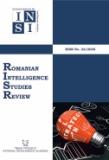ALTERNATIVE SCENARIOS IN SECURITY AND INTELLIGENCE STUDIES: METHODS OF IDENTIFICATION AND ANALYSIS OF PROJECTION FACTORS. PROPOSAL OF A CLASS EXERCISE
ALTERNATIVE SCENARIOS IN SECURITY AND INTELLIGENCE STUDIES: METHODS OF IDENTIFICATION AND ANALYSIS OF PROJECTION FACTORS. PROPOSAL OF A CLASS EXERCISE
Author(s): Ileana-Cinziana SurduSubject(s): Business Economy / Management, Government/Political systems, Security and defense, Policy, planning, forecast and speculation, Post-War period (1950 - 1989), ICT Information and Communications Technologies
Published by: National Institute for Intelligence Studies
Keywords: alternative scenarios; multiple scenarios; projection factors; keydrivers; security and intelligence studies;
Summary/Abstract: Forecasting methods are used in different areas, different contexts, but with the same final purpose: evaluating possible futures. Alternative scenarios are an efficient tool of identifying alternative futures, based on past and present actions and contexts. Since gaining popularity, in the 1950s, the scenario method has been constantly improved and has evolved into different typologies. The qualitative approach of the alternative scenarios method allows for insightful analysis and debate on the topic addressed, based on the projection factors that describe the situation under study. The scenario method can be adapted to different types of situations and to different timeframes. The article discusses various scenario designs and reviews their primary characteristics, sending the reader to further information. Without representing a formal institutional method of analysis, alternative scenarios can successfully be used in processes that target risk assessments and mitigations, tackling vulnerabilities, identifying gaps and needs, anticipating attacks and possible associated tools, but also the elaboration of strategies on a long, medium and short-term. This paper proposes a class exercise based on the elaboration of alternative scenarios. As support for both the lecturer, who will act as the moderator, and the students, who will be the participants of the exercise, the article discusses the research method proposed through definitions, characteristics and classifications, advantages and disadvantages, methods of identification and analysis of projection factors, and also the utility of the method for the intelligence and security studies.
Journal: Romanian Intelligence Studies Review
- Issue Year: 2020
- Issue No: 24
- Page Range: 141-156
- Page Count: 16
- Language: English

